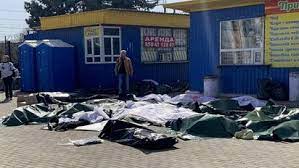Manas Dasgupta
NEW DELHI, April 8: The death toll in the rocket attack on a railway station on Friday in the eastern Ukrainian city of Kramatorsk went up to 50 by evening while more than 300 persons were wounded. The deceased included five children, Pavlo Kyrylenko, the Governor of the Donetsk region said.
“Fifty dead, five of them children. This is the death toll at this hour after the strike by Russian occupational forces on the train station in Kramatorsk,” Kyrylenko said on Telegram. He warned that the number of victims is likely to change, saying there are still 98 people wounded, including 16 children. Kyrylenko said 12 of the victims died from their wounds in hospital, while 38 were killed “on the spot.” He said, “The occupiers must be punished for their crimes.”
The rocket attack which was one of the deadliest strike in the six-week old war, came as civilians raced to leave the Donbas region in the crosshairs of the Russian Army to some relatively safer parts of the country. President Volodymyr Zelensky reported 300 were injured, saying the strike showed “evil with no limits”. The station is used to evacuate civilians from areas under bombardment from Russian forces. Russia has denied of having launched the rocket attack and accused Kyiv of staging the attack.
Accusing Ukraine of carrying out the deadly attack, Russia said, “The purpose of the Kyiv regime’s attack on the railway station in Kramatorsk was to disrupt the mass exit of residents from the city in order to use them as a ‘human shield’ to defend the positions of Ukraine’s armed forces,” the Defence Ministry said. The Ministry claimed that the attack was carried out by Ukraine’s forces from the town of Dobropillya, some 45 kilometres (27 miles) southwest of Kramatorsk.
“Tochka-U tactical missiles, the fragments of which were found near the railway station of Kramatorsk, are used only by the Ukrainian armed forces,” the Ministry added. Earlier on Friday, the Ministry denied it was behind the attack that killed at least 39 people, including at least four children, and said it was a “provocation” from the Ukrainian side.
The European Union nations, meanwhile, have agreed to ban Russian coal in the first sanctions on the vital energy industry over the Ukraine war but it has underlined the inability of the 27 countries to agree so far on a much more sweeping embargo on oil and natural gas that would hit Russia harder but risk recession at home. The coal ban should cost Russia four billion euros ($4.4 billion) a year, the EU’s executive commission said. Energy analysts and coal importers say Europe could replace Russian supply in a few months from other countries, including the U.S.

